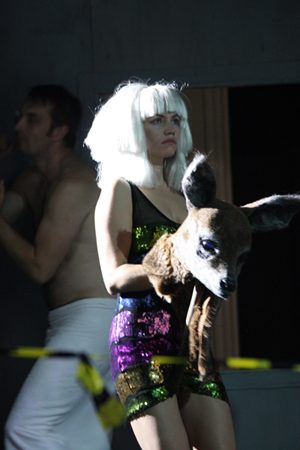Three Kingdoms, Lyric Hammersmith | reviews, news & interviews
Three Kingdoms, Lyric Hammersmith
Three Kingdoms, Lyric Hammersmith
Simon Stephens’s new play has vivid moments but finally fails to satisfy

Simon Stephens is not only one of our most talented playwrights, he’s also the one most open to influences from German theatre. In 2007, he collaborated with director Sebastian Nübling on the world premiere in Hanover of his innovative play, Pornography, which took more than a year to be staged in the UK, in a superb version by Sean Holmes. Holmes is now head of the Lyric Hammersmith, which hosts Stephens’s latest collaboration with Nübling.
Three Kingdoms is a dark thriller about sex trafficking. It begins with two British detectives, the botany-loving Ignatius and the German-speaking Charlie. When a gruesomely severed woman’s head is found in the Thames, the duo begin to trace the victim, who turns out to be a prostitute trafficked from the Continent. They travel to Germany to seek the killer, whose DNA has been found in the semen in her hair, and get help from local cop Dresner. Together the trio head East.
The grim story becomes a three-hour phantasmagoriaUnder Nübling’s direction, this grim story becomes a three-hour phantasmagoria whose battery of lurid highlights include a petty crim’s speech delivered with a photograph stuck to his face, a coroner’s assistant who peels an apple while giving an autopsy report, a corpse that clutches a detective’s hand, a crazy rendering of the Beatles "Rocky Racoon", a scene in a factory for porn movies that effectively mixes disgust with boredom. There are strap-ons galore, and lots of moody songs.
 For me, the most successful scenes were those heaviest in visual metaphor (pictured right). Whores appear dressed in furs and with deer heads; sinister males appear in wolf masks. This symbolism suggests the animal nature of desire, and hints also at its irrationality. It’s very David Lynch, very magical. At another moment, a woman emerges from a suitcase, a sharp and simple metaphor for trafficking.
For me, the most successful scenes were those heaviest in visual metaphor (pictured right). Whores appear dressed in furs and with deer heads; sinister males appear in wolf masks. This symbolism suggests the animal nature of desire, and hints also at its irrationality. It’s very David Lynch, very magical. At another moment, a woman emerges from a suitcase, a sharp and simple metaphor for trafficking.
Quite near the end, criminals wearing boxing gloves pummel the walls of Ene-Liis Semper’s set, which looks like a distressed warehouse, one of whose walls is covered in bloody handprints. Yet, amid all the extravagance of Nubling’s production, you can sometimes even get a glimpse of Stephens’s text. In one of the many jokes of the evening, Ignatius can’t speak a word of German, giving a strong sense of being at sea in a culture clash between the Brits and the Germans.
Likewise, Stephens’s text is often hidden amid the babble of German and Estonian words (this is a co-production with the Munich Kammerspiele and Estonia’s Teater NO99), and it is hard to see through the mists of the Germanic acting (lots of nudity) and Germanic soulfulness (I almost said angst). When you can hear it, Stephens’s text is punchy and direct, throbbing with pent-up emotion and vivid imagery. Typically, the dialogue is energetic and the longer speeches full of excruciating and savage imagery, plus there’s his love of pop music. He also articulates a real disgust at the smell of porn.
There is no denying the power of some scenes, but equally no denying the self-indulgence and spirit-sapping quality of many others. I wish someone had convinced Nübling to cut most of the songs (less is more), cut the slow-mo floor-mopping (really), cut the repeated lines (the word "fuck" loses power with every utterance), cut the suitcase pile-up (we’ve seen it before) and cut the postmodern winks to the audience (yes, we know it’s theatre). Normally, I love inventive Continental directing, but this is not so much inventive as invasive.
So despite the beautiful air of melancholy and menace, the dance moves and the cabaret, there are too many trivial moments and the acting, led by Nicolas Tennant and Ferdy Roberts as the tecs, with sporadic help from Steven Scharf, Lasse Myhr, Mirtel Pohla and Çigdem Teke, tends to get drowned out by the excesses. But if it’s a lesson in how to slow down a story that you want, come and see this show. Nübling certainly knows how to spin things out.
rating
Buy
Explore topics
Share this article
The future of Arts Journalism
You can stop theartsdesk.com closing!
We urgently need financing to survive. Our fundraising drive has thus far raised £49,000 but we need to reach £100,000 or we will be forced to close. Please contribute here: https://gofund.me/c3f6033d
And if you can forward this information to anyone who might assist, we’d be grateful.

Subscribe to theartsdesk.com
Thank you for continuing to read our work on theartsdesk.com. For unlimited access to every article in its entirety, including our archive of more than 15,000 pieces, we're asking for £5 per month or £40 per year. We feel it's a very good deal, and hope you do too.
To take a subscription now simply click here.
And if you're looking for that extra gift for a friend or family member, why not treat them to a theartsdesk.com gift subscription?
more Theatre
 Troilus and Cressida, Globe Theatre review - a 'problem play' with added problems
Raucous and carnivalesque, but also ugly and incomprehensible
Troilus and Cressida, Globe Theatre review - a 'problem play' with added problems
Raucous and carnivalesque, but also ugly and incomprehensible
 Clarkston, Trafalgar Theatre review - two lads on a road to nowhere
Netflix star, Joe Locke, is the selling point of a production that needs one
Clarkston, Trafalgar Theatre review - two lads on a road to nowhere
Netflix star, Joe Locke, is the selling point of a production that needs one
 Ghost Stories, Peacock Theatre review - spirited staging but short on scares
Impressive spectacle saves an ageing show in an unsuitable venue
Ghost Stories, Peacock Theatre review - spirited staging but short on scares
Impressive spectacle saves an ageing show in an unsuitable venue
 Hamlet, National Theatre review - turning tragedy to comedy is no joke
Hiran Abeyeskera’s childlike prince falls flat in a mixed production
Hamlet, National Theatre review - turning tragedy to comedy is no joke
Hiran Abeyeskera’s childlike prince falls flat in a mixed production
 Rohtko, Barbican review - postmodern meditation on fake and authentic art is less than the sum of its parts
Łukasz Twarkowski's production dazzles without illuminating
Rohtko, Barbican review - postmodern meditation on fake and authentic art is less than the sum of its parts
Łukasz Twarkowski's production dazzles without illuminating
 Lee, Park Theatre review - Lee Krasner looks back on her life as an artist
Informative and interesting, the play's format limits its potential
Lee, Park Theatre review - Lee Krasner looks back on her life as an artist
Informative and interesting, the play's format limits its potential
 Measure for Measure, RSC, Stratford review - 'problem play' has no problem with relevance
Shakespeare, in this adaptation, is at his most perceptive
Measure for Measure, RSC, Stratford review - 'problem play' has no problem with relevance
Shakespeare, in this adaptation, is at his most perceptive
 The Importance of Being Earnest, Noël Coward Theatre review - dazzling and delightful queer fest
West End transfer of National Theatre hit stars Stephen Fry and Olly Alexander
The Importance of Being Earnest, Noël Coward Theatre review - dazzling and delightful queer fest
West End transfer of National Theatre hit stars Stephen Fry and Olly Alexander
 Get Down Tonight, Charing Cross Theatre review - glitz and hits from the 70s
If you love the songs of KC and the Sunshine Band, Please Do Go!
Get Down Tonight, Charing Cross Theatre review - glitz and hits from the 70s
If you love the songs of KC and the Sunshine Band, Please Do Go!
 Punch, Apollo Theatre review - powerful play about the strength of redemption
James Graham's play transfixes the audience at every stage
Punch, Apollo Theatre review - powerful play about the strength of redemption
James Graham's play transfixes the audience at every stage
 The Billionaire Inside Your Head, Hampstead Theatre review - a map of a man with OCD
Will Lord's promising debut burdens a fine cast with too much dialogue
The Billionaire Inside Your Head, Hampstead Theatre review - a map of a man with OCD
Will Lord's promising debut burdens a fine cast with too much dialogue

Add comment